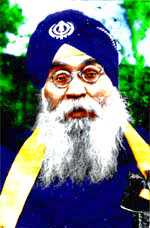Randhir Singh (Sikh)

Randhir Singh (1878–1961) is regarded by many Sikhs as a Saint. He wrote extensively on Gurbani and the Sikh way of life, pioneered the Gurdwara Sudhaar Movement, and founded the Akhand Kirtani Jatha (AKJ) which is a Jatha (group).
His name is often found as Bhai Randhir Singh, and Bhai Sahib Randhir Singh Jee. Bhai, Sahib, and Ji (or Jee) are honorifics.
Life
Randhir Singh's original name before baptism and initiation into the Khalsa was Basant Singh. He was born in the village of Narangwal in the Ludhiana District of Punjab on July 7, 1878 to a family of a very noble and devout heritage. His father, S. Natha Singh, was a learned scholar of Punjabi, Hindi, Urdu, Persian and English, who initially worked as a District Inspector of Schools but later rose to the rank of a Judge in the High Court of the State of Nabha.
His mother, Sardarni Punjab Kaur, was a direct seventh-generation descendant of Bhagtu, a disciple of Sri Guru Arjan Dev Ji Sahib and Sri Guru Hargobind Sahib.[citation needed]
He completed his schooling in Nabha and higher education from Government and Foreman Christian Colleges at Lahore.
Randhir Singh wrote various books on Sikh theology, philosophy, and the Sikh way of life.
He was charged in 1914 with waging war against the British Crown and had to undergo life-imprisonment from 1914 to 1931.
He died on Vaisakhi, April 13, 1961 and his Antam Sanskar (cremation) took place at the lake between Gujjarwal and Narangwal. To gain more knowledge about Bhai Randhir Singh Ji life, one should read "Autobiography of Bhai Sahib Randhir Singh" which was translated by Bhai Tricholan Singh. This can be found as a pdf on Google. It has given insight to his journey of life also insight into his love and strong love for Sikhi and the Guru.
Reception
Randhir Singh was very prominent in the Sikh religion and politics. There was wide recognition of his high spiritual character and achievements , as well as sacrifices for the freedom of the Sikhs and India. During the British Raj, many of the Jatha went to jail in the anti-British movement, and suffered torture. Randhir Singh and Attar Singh, with many other pious Sikhs, had brought a lot of change in the Sikh nation via the Gurdwara Sudhaar Movement. They worked under the banner of the Panch Khalsa Divan.
Conference at Patiala
There was a conference at Patiala, Panjab, organised by the Maharaja of Patiala,[citation needed] Randhir Singh was made president of the conference, and he gave a powerful address in this conference condemning the corrupt forces in the Sikh nation.[citation needed] Randhir Singh told the Maharaja that his throne had been blessed to him by the True Guru, and that he must give his kingdom to the Sikh nation, or he would lose it: such has happened today.[citation needed] Attempts were made to intimidate Randhir Singh at that conference to prevent him speaking his beliefs, but Randhir Singh was full of Tat Gurmat (pristine Guru's message) and passion.[citation needed] Giani Amolak Singh and other Gursikhs stood with Randhir Singh to make sure Tat Gurmat was stated.[citation needed]
Publications
- Gurmat Lekh (1937)
- Gurmat Nam Abhiyas Kamai (1938)
- Jail Chittian (1938)
- Charan Kamal Ki Mauj (1939)
- Kee Sri Guru Granth Sahib Di Puja But Prasti Hai? (1940)
- Anhad Shabad Dasam Duaar (1942)
- Amrit Kalaa
- Gurmat Bibek (1949)
- Andithi Duniya (1949)
- Karam Philosophy (1951)
- Baba Vayd Rogiaa Da (1952)
- Gurmat Ramjaa (1952)
- Haumai Naavay Naal Virodh Hai
- Temar Aageya Thu Oajara Aerthat Gyan Chanha
- Darshan Jhalkaan
- Granth Prem Sumarg (1953)
- Gurbani diyan Lagaan Matraan dee Vilakhantaa (1954)
- Sant Padh Nirnay (1954)
- Ik Umar Kaidi Da Supna
- Katha Keertan (1957)
- Sikh Itihaas De Partakh Darshan (1958)
- Jhatka Maas Prathai Tat Gurmat Nirnay (1958)
- Sachkhand Darshan (1959)
- Zaharaa zahoor Guru Gobind Singh
- Amrit Ki Hai? (1960)
- Aastak Tei Naastak
- Gagan Oudaree
- Rangle Sajjan
- Jyot Vigaas
- Sikh Kaun Hai?
References
External links
| ||||||||||||||
|